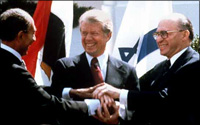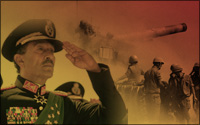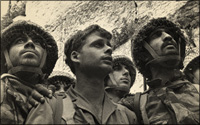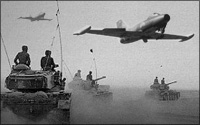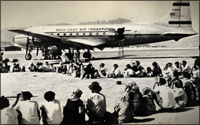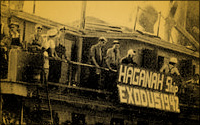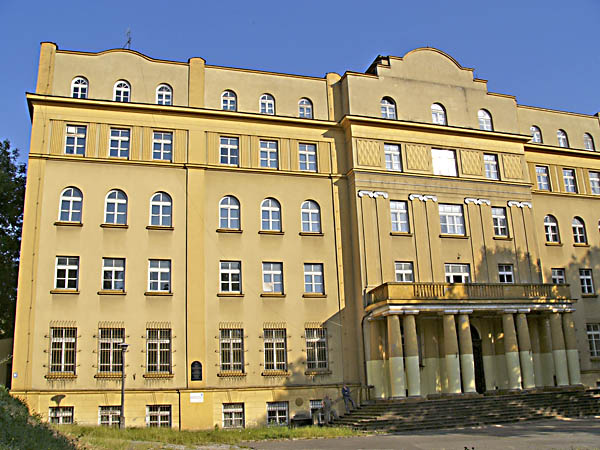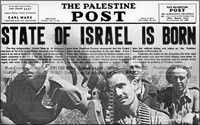 The birth of the State of Israel is, historically, one of the most remarkable events not only in Jewish history but world history. As all events in Jewish history, it has great religious overtones, in addition to its enormous psychological and sociological overtones. Even so, at this juncture it is very difficult to assess it properly in its full perspective; aspects of it have not yet clearly been settled.
The birth of the State of Israel is, historically, one of the most remarkable events not only in Jewish history but world history. As all events in Jewish history, it has great religious overtones, in addition to its enormous psychological and sociological overtones. Even so, at this juncture it is very difficult to assess it properly in its full perspective; aspects of it have not yet clearly been settled.
All the events leading up to the state – e.g. the Partition Plan, the beginning of the war in December 1947, retaliations by the Stern Gang, Irgun and Hagannah – came to a head in the spring of 1948 when it became apparent that England was going to leave and its departure was going to result in chaos and a vacuum of leadership. The Jews would have to fend for themselves. It also became very evident that the surrounding Arab countries fully intended to invade Palestine and destroy the Jewish population.
Within three years of the Holocaust in Europe, the Jewish people faced the prospect of another holocaust. It had the potential to be such an aftershock that there would be no telling what the accumulated effect would have wrought.
The Jews took up the struggle with a great deal of heroism, not to mention a great deal of help from Jews abroad. Jewish soldiers who served in the European theater joined their brothers in Palestine. Jewish businessmen in the United States arranged to bring weapons to Israel illegally. Many of them ended up sitting in jail for violating the neutrality and embargo laws. There was a sense of urgency. It was a ‘do or die’ attitude
The day before the state was proclaimed, the Etzion bloc, which consisted of four kibbutzim, fell to the local militia and Jordanian army. Almost all the Jewish males were killed and a great many of their bodies mutilated. When they fell, it was not only a military defeat, but a psychological one.
At the same time, the Jews were also driven out of the Old City of Jerusalem. The Jordanian army took civilians as prisoners and destroyed all 42 of the synagogues in the Old City, including the one purchased by Nachmanides in 1270. The great Hurva Synagogue was made into a way station for donkeys, until it simply collapsed. All of the houses of prayer and learning that had been so infused with Jewish life and Jewish warmth fell to the marauding invaders.
Even with all that, the thing that remains most indelibly marked on the memories of those who lived through this time was the announcement of the declaration of the state. The emotions of even simple non-religious and non-Zionistic Jews stirred like never before in their lives. Even non-Jews were caught up in the euphoria: the non-Jewish mayor of Chicago wept at a public event, bowled over with emotion when he recognized the historical moment he was experiencing.
The Invasion
However, as Jews the world over acknowledged the magnitude of the event, they shuddered from the dangers that abounded. No one knew what the future would bring.
During the broadcast proclaiming the new Jewish state one heard Egyptian bombers in the background bombing Tel Aviv. On that day five major Arab armies invaded: Egypt, Iraq, Jordan, Syria and Lebanon. Saudi Arabia also sent a token brigade. Facing them was a handful of defenders. Ben Gurion wrote that they had only 35,000 people mobilized. They initially had no heavy machine guns, artillery, armored vehicles, anti-tank or anti-aircraft weapons, nor military aircraft or tanks.
The Arabs, on the other hand, were led by the Arab Legion, which was a British-trained and British-officered army. It was the best army in the Middle East and commanded by an Englishman, Sir John Bagot Glubb, known as Glubb Pasha. Jerusalem had been under siege for many months and its main road had been cut off by the Arab Legion, making it impossible for Jewish forces to get to Jerusalem from Tel Aviv.
As the Jordanians choked Jerusalem, the Egyptian army advanced north. They hoped to capture Jerusalem themselves, as well as Tel Aviv, thereby winning the war. Almost as much as the Egyptians wanted the Jews out of the country, they wanted King Abdullah of Jordan out of the country.
The Egyptians came north in two prongs. One headed toward Beersheba, which was on the path to Jerusalem. They were supposed to coordinate their efforts with the Arab Legion. Had they done so, the Egyptians almost certainly could have broken through. However, the Jordanians and Egyptians did not cooperate with each other, and the Egyptian army was stopped five miles south of Jerusalem.
The other Egyptian prong broke off at the Gaza Strip and attacked north along the coast toward Tel Aviv. They had enough men and were well equipped, but they, too, fell short of their objectives. One reason was corruption. It started at the top with the king of Egypt, Farouk, who in addition to being a serial pedophile was also an arms dealer that sold faulty weapons to his own army. Every third Egyptian gun failed to fire; every other Egyptian bullet did not have enough powder in it. This war would be the end of Farouk in Egypt once it was revealed that he sold out his own army to make a profit.
Round Two
By the end of June, the Arab offensive had run out of steam. It was then that the Security Council of the United Nations called for a cease fire. The Israelis also agreed to it because they had used up virtually all their ammunition.
The United Nations appointed a mediator, a Swedish count, by the name of Folke Bernadotte. During the war, he and other members of the Swedish royal family had helped save Jews from Hitler. When he arrived, he was assassinated by members of the Stern Gang. As a result, the mediation collapsed. Both sides prepared for a second round of fighting.
There was no place in the world for Israel to buy modern arms. They were under embargo throughout the West, including the United States, France and Britain. The only option they had was to turn to the Soviet Union.
Incredibly, the Soviets permitted the Israelis to buy arms from a manufacturer in Czechoslovakia, one of the largest armament companies in the world. They were able to buy old Messershmitt planes, B-17 bombers, mortars, anti-tank guns, ammunition, etc. All this was acquired during the cease fire – a brief period of less than 30 days.
The second round of fighting began on July 8, 1948. The Arabs were hopeful, but within two weeks they realized that they were about to suffer a complete and total defeat. The Israeli army was on the offensive on all fronts.
The Israelis even had the temerity to invade the Sinai. When they captured Eilat, Ben Gurion received a letter from the British, he records in his memoirs, saying that if he did not stop they would intervene. It would take a number of years before the relationship between Israel and Great Britain would warm up again.
The only Arab army not defeated was the Jordanian Arab Legion. Other than that, the entire ring around the Jews dissolved. Realizing they had no choice, the Arabs sued for peace.
The Arab Refugee Problem
The Arab population had long been propagandized by Arab leaders that the combined might of the Arab armies would drive the Jews into the sea. If, the Arab leaders told their fellow Arabs, they moved out of the war zone to safety then they could return to take all the loot and new homes they wanted after the Jews were annihilated.
Thus began the Arab refugee problem. Hundreds of thousands of Arabs fled. Some fled with Israeli encouragement, but the basic encouragement came from fellow Arabs. When they arrived among their brethren they were not treated as welcomed guests. They were instead assigned terrible living conditions, and became wards of the United Nations.
With Israel having successfully repelled the armies of the Arab states that attempted to destroy it, the anger, humiliation and frustration of the Arab masses was violently vented against the Jews of Algeria, Morocco, Libya, Egypt, Iraq, Syria and Lebanon. In a chilling description of the atrocities perpetrated against the Jews of those countries, Sir Martin Gilbert (In Ishmael’s House) details the full horror of those developments. As he wryly notes there were 726,000 Arab refugees from Palestine after the War of Independence while there were 850,000 Jewish refugees from Arab lands. The difference in the world’s treatment of these different groups of refugees is startling and disheartening.
Fire, Flame and Blood
Dr. Ralph Bunche, who later would win the Nobel Prize, was appointed by the United Nations to mediate. He negotiated armistice agreements between each of the individual Arab nations and the State of Israel. From the Jewish point of view, if the agreements were imperfect and the borders established indefensible, at least there was a Jewish state. They had triumphed. The State of Israel came into being – however, at a great cost. The Jews suffered over 6,000 losses – 1% of the population – the equivalent of three million Americans.
The problems of the new country were enormous – but it existed. In fire, flame and blood Israel had survived. And this triumph created a new focal point in Jewish history, one which we are still in the midst of.

